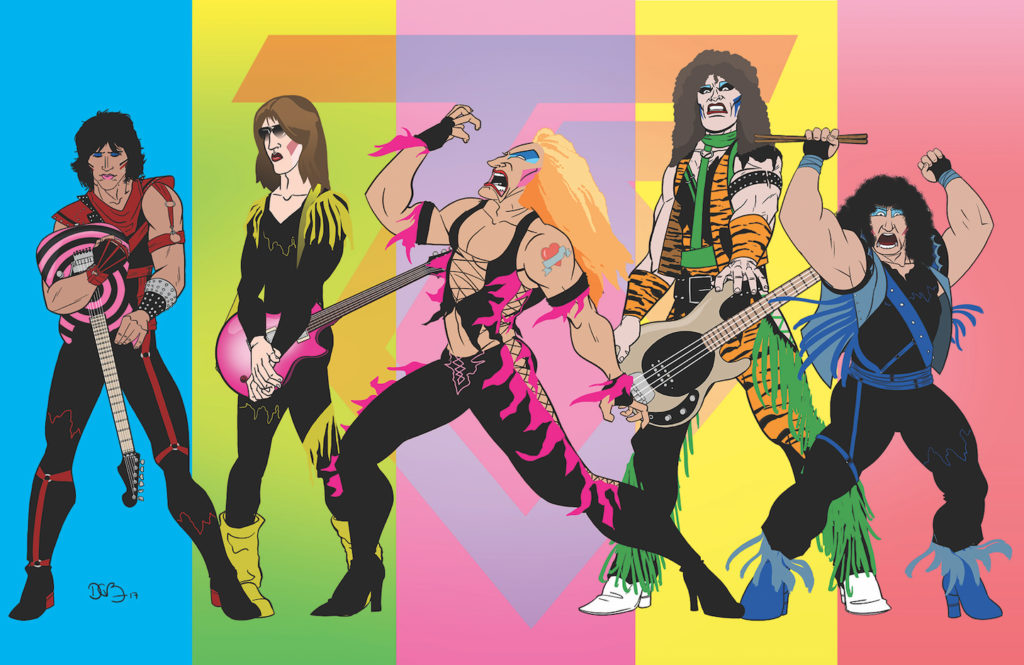Twisted Tweeting
It’s not a secret that I’m a fan of the ’80s metal band, Twisted Sister. In fact, on this very website I have drawn each band member in my cartoony style to pay tribute to their influence on my life (which was later shared on their official social media channels and still pops up occasionally on their feed, which is cool). Their music––and their attitude––said what I needed to hear at an impressionable age, despite it being nearly a decade after the band had broken up by the time I found them.

Knowing that, it’s probably not surprising to hear that I follow the band on various platforms, including their singer Dee Snider.
Earlier this week, a user on Twitter––someone called @ShannaHamm––asked a simple question:
After giving it serious thought, I replied with two songs, because I’m an over-achiever when it comes to my passions. First, the title track off of Twisted Sister’s third album, Stay Hungry, as well as the closing track off of Standby For Pain, the second and final album by a post-Twisted band, Widowmaker, and the song, “All Things Must Change.”
@ShannaHamm asked for clarification, so I did my best to summarize my thoughts without going into a multi-tweet tirade:
“All Things Must Change”––and the entire album––make up a powerful statement by Dee. Released in 1994, it was a hard time for heavy metal music as grunge/alt. rock––spearheaded by the likes of Nirvana, Pearl Jam, Soundgarden, and Alice in Chains––took the reins of heavy and angry music from the metal bands that were previously leading the horse.
It seemed to be just as much of a hard time for Dee Snider as he fought to get his new band off the ground with a new sound (their first album was much more traditional ’80s metal) and lyrics that went beyond simple tropes of gruff masculinity and teenage angst.
Instead, Standby For Pain is a portrait of a man looking at––for lack of a better word––the ruins of his career, one that came down simply because culture changed and he flew too close to the sun on wax wings. The songs are painfully personal and revealing and mature––”mature” in a sober, thoughtful, and complicated way. Beyond Dee himself, it stands as a eulogy for an entire genre––and its honesty is nearly unprecedented in metal at that point. I don’t think I’m exaggerating when I say that Dee and his band truly broke new ground with this album by offering such an unvarnished and private look inside a heavy metal musician’s psyche…and pairing it with amazing riffs (seriously, the musicianship on this album is outstanding).
I rebuffed the album initially because it sounded much different than what I expected, but as I gave it time and focused listens, I found much more to mine from these songs than most of Dee’s other music, and it soon became one of my favorite albums of all time, one I pushed onto friends, forcing them to appreciate its artful anger and sadness. Of all his music, this album would be the one thing I would love to talk to Dee about if given the chance to only talk about one album’s worth of music.
So, imagine my surprise when Dee Snider actually responded to my thoughts:
Needless to say, I was a bit of a wreck that day.
I did respond, thanking him for the album, trying to get across how important an album it is to me (and how I think it’s actually an important album to the genre, but that’s just me), knowing he may see it but would not be likely to respond. But then, he did:
I may never get to actually have a sit down with Dee and talk about things like the Standby For Pain album, but it’s nice to see that the aggregate personality I assembled for Dee in my head over the years––gathered by sifting through his music, his interviews, his writings––seems to be fairly accurate: a thoughtful, empathetic guy who is more than the wild hair and fuck-off attitude, though that is certainly a major part of him, too (and I’m glad).
To put a bow on this, the website/blog, Metal Head Zone, thought this exchange was newsworthy, building a short article around it. I clicked on it when Twitter showed me the link, not realizing it was built around my tweet (okay, mine and someone else’s, too), thinking it was just the result of some Twitter algorithm that saw me interacting with Dee Snider.
Altogether, it has been a few strange days, but no less memorable and amazing.

Discussion ¬